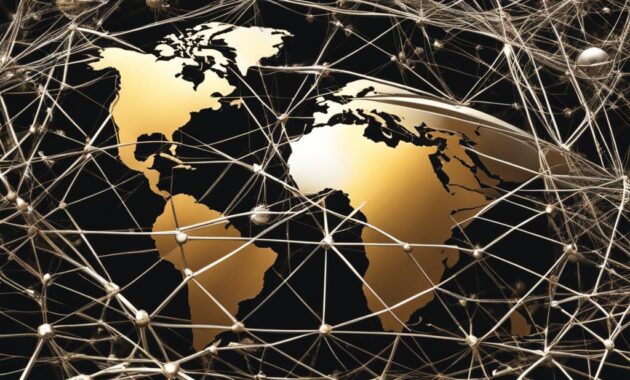Welcome to our exploration of global economic governance. In this section, we will take a closer look at the structures and challenges facing this critical aspect of the global economy.
Global economic governance refers to the systems, institutions, and structures that seek to regulate and coordinate international economic activities. These structures play a crucial role in ensuring economic stability, promoting prosperity, and reducing poverty worldwide.
However, the challenges facing global economic governance are numerous. From rising inequality to geopolitical tensions and climate change, the obstacles that must be overcome are formidable.
Understanding these challenges and the structures that underpin global economic governance is critical to charting a path forward that promotes sustainable and inclusive economic growth for all. Join us as we explore this vital topic in depth.
Understanding Global Economic Governance
Here, we will provide a comprehensive understanding of global economic governance and its importance in regulating and coordinating international economic activities. Global economic governance refers to the set of institutions and frameworks that shape the global economy. These structures include international organizations such as the International Monetary Fund (IMF), the World Bank, the World Trade Organization (WTO), and the United Nations Conference on Trade and Development (UNCTAD).
The role of these institutions is to facilitate cooperation and coordination among nations to ensure global economic stability and growth. Governments, multinational corporations, and civil society organizations are among the major actors involved in global economic governance.
International Organizations and Their Role
The International Monetary Fund (IMF) is a vital pillar of global economic governance. It works to promote international monetary cooperation and exchange rate stability, facilitate the balanced growth of international trade, and provide resources to help countries in need of financial assistance.
The World Bank is another significant international organization that promotes development and poverty reduction by providing loans, credits, and grants to developing countries. It also offers technical assistance and policy advice to support economic growth.
The World Trade Organization (WTO) is responsible for regulating and promoting international trade, ensuring that countries comply with the rules and agreements they have made. The WTO aims to create a level playing field for international trade, reduce barriers to trade, and increase economic growth.
The United Nations Conference on Trade and Development (UNCTAD) focuses on promoting development-friendly integration of developing countries into the world trade system. It provides policy advice, technical assistance, and capacity building to help developing countries benefit from international trade.
Mechanisms of Global Economic Governance
The mechanisms employed by global economic governance structures include policy coordination, financial regulation and supervision, and international trade agreements. Policy coordination involves collaboration between countries to develop policies that promote economic growth and stability. Financial regulation and supervision ensure that financial institutions operate in a sound and stable manner that protects consumers and promotes financial stability.
International trade agreements provide a framework for countries to conduct trade in a fair and predictable manner. These agreements establish rules, regulations, and standards for international trade, ensuring that countries comply with shared goals.
“Global economic governance is essential in ensuring that the global economy works for everyone. It requires cooperation and collaboration among nations to tackle the challenges of our interconnected world.”
Understanding global economic governance is crucial in today’s constantly evolving global economy. By examining the structures, actors, and mechanisms involved, we can gain insight into how the global economy operates and the challenges it faces. In the next section, we will explore some of the significant challenges encountered in global economic governance.
Challenges in Global Economic Governance
As we explore the concept of global economic governance, we cannot ignore the numerous challenges it faces in today’s world. These challenges threaten the stability and sustainability of the global economy, and must be addressed effectively.
Inequality
One of the key challenges facing global economic governance is inequality. The gap between the wealthy and the poor continues to widen, and this trend is not sustainable. Inequality can lead to social unrest, economic instability, and even conflict.
Solutions to this challenge include progressive taxation, social safety nets, and investments in education, healthcare, and infrastructure. However, implementing these solutions requires political will and international cooperation.
Trade Conflicts
Trade conflicts between nations pose a threat to the global economy. Protectionist policies and tariffs can harm international trade and reduce economic growth. The ongoing trade dispute between the United States and China, for example, has disrupted global supply chains and increased uncertainty.
To address this challenge, nations must engage in constructive dialogue and negotiate fair trade agreements. International organizations such as the World Trade Organization (WTO) can also play a vital role in resolving trade disputes and ensuring a level playing field for all countries.
Financial Crises
Financial crises, such as the 2008 global financial crisis, have a devastating impact on the global economy. They can lead to job losses, business closures, and a decline in economic activity. The interconnectedness of the global economy means that a crisis in one nation can quickly spread to others.
To prevent and mitigate financial crises, nations must regulate financial markets effectively, promote transparency, and strengthen the international financial architecture. The International Monetary Fund (IMF) and other international organizations can provide financial support and technical expertise during crises.
Climate Change
Climate change poses a significant threat to the global economy. Rising sea levels, extreme weather events, and other consequences of global warming can harm infrastructure, disrupt supply chains, and reduce economic output.
Addressing this challenge requires global cooperation and a commitment to reducing greenhouse gas emissions. Nations must work together to transition to a low-carbon economy and invest in renewable energy and sustainable infrastructure. Businesses and investors can also play a critical role in driving this transition.
In conclusion,
Global economic governance faces a range of challenges that threaten the stability and sustainability of the global economy. These challenges require collective action and cooperation among nations, international organizations, and the private sector. By addressing these challenges effectively, we can create a more equitable, prosperous, and sustainable global economy for all.

Conclusion
In conclusion, our exploration of global economic governance has provided us with valuable insights into the structures and challenges of the global economy. We have seen how global institutions and frameworks play a critical role in shaping economic policies and facilitating international cooperation.
However, we have also recognized the significant challenges that global economic governance faces, such as inequality, trade conflicts, financial crises, and climate change. These challenges threaten the stability and growth of the global economy and require urgent attention.
Despite these challenges, we remain optimistic about the potential for effective global economic governance. By promoting cooperation and collaboration among nations and stakeholders, we can build strong and inclusive governance structures that can adapt to the changing needs of the global economy.
Ultimately, we must recognize that global economic governance is a shared responsibility that requires the participation and commitment of all nations. By working together, we can create a more prosperous and sustainable future for ourselves and future generations.




